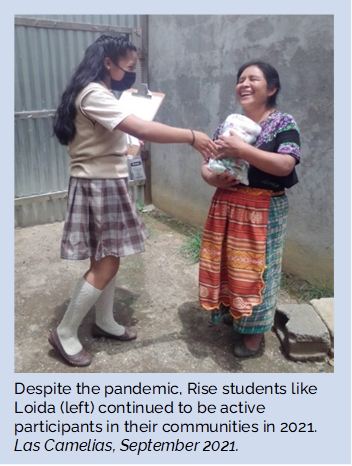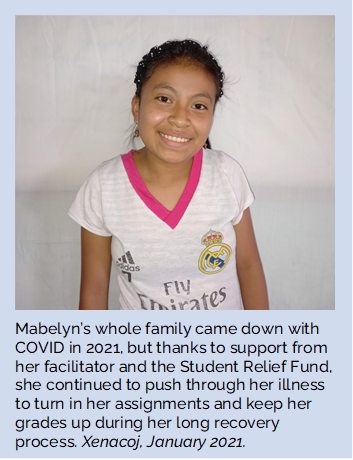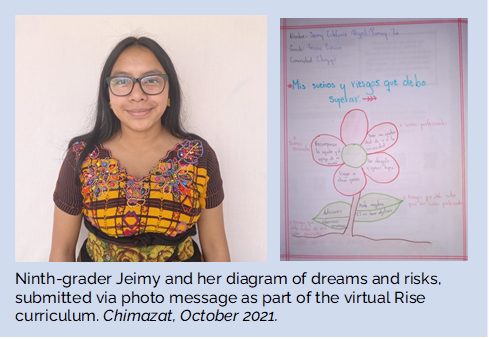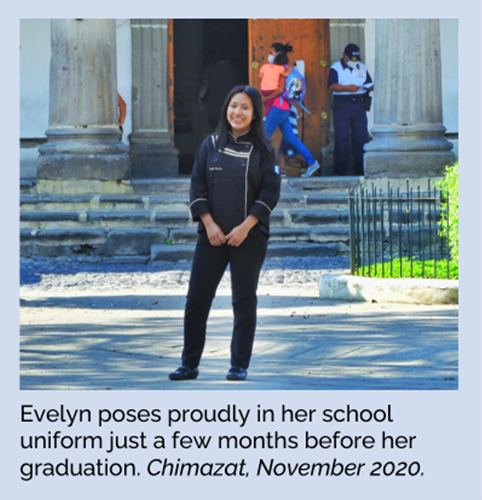A disheartening 90% of kids in rural Guatemala who are living in poverty never graduate from high school. This means that schools in rural Guatemala are essentially dropout factories continuing the cycle of illiteracy and limited opportunities. [1]
According to USAID, it takes at least 12 years of education for an indigenous Guatemalan to permanently rise out of poverty. [2] Research also shows that providing scholarships plays an important role in expanding access to education—especially for girls—and improves the conditions of developing countries, like Guatemala. [3]
That, my friends, is the key to breaking the cycle of poverty. The future of rural Guatemala is directly linked to providing better education. So how are we turning this research into action?
Let’s go straight to rural Guatemala and meet a few of CoEd’s hard-working students who are taking charge of their own futures through education!
Current CoEd Students:


CoEd’s Rise Youth Development Program has nearly two decades of experience challenging traditional views about girls’ education—and education in general. In the Thousand Girls Initiative, we have been working to reach (you guessed it!) 1,000 girls in rural communities across Guatemala to create a growing middle class of indigenous families—and ensuring that future generations will not repeat the cycle of poverty.


Throughout 2021, CoEd continued working toward our goal of 1,000 girls by recruiting additional girls to begin the program in future years. So far in 2022, more than 250 girls have already joined the program! Many of these new students were even able to benefit from the program’s support system during 2021, as they waited to officially enter Rise, keeping in regular contact with the local facilitators who live in their communities. Local facilitators are continuing to reach out to additional candidates for the program, striving to give even more families have the necessary support system to weather the COVID-19 pandemic without having to pull their daughters out of school.

What about the boys?
Fear not! This was not an oversight. We believe that all children born into the cycle of poverty deserve the opportunity to rise above their current circumstances. In Guatemala, girls are not traditionally supported in their desire to go to school. Often, when parents have to decide which child to educate on their meager earnings, they prioritize the boys, and the girls get left behind.
In the regions we serve, there is nearly a boy and a half in school for every girl. In Guatemala as a whole, 80% of men are literate, compared to 58% of women. So, the Thousand Girls Initiative includes 250 boys! Plus, when girls and boys learn together, they learn from each other, too.
Graduated CoEd Students:
Evelyn, pictured below, dreamed of opening her own restaurant ever since she was little. But her family’s meager income meant that she would soon have to drop out of school to work and help take care of her younger sisters. That all changed when she was selected for a Rise scholarship. With the support of Rise, Evelyn continued working toward her dream, pursuing her diploma in gastronomy. Despite the challenges of the pandemic, she finished her degree in 2021! Right before graduation, Evelyn wrote her sponsors,
“Thanks to your financial support I am almost going to graduate, but without your support that would not be happening. I will always be grateful. At this moment, I am in my last year of studies, my parents and siblings are very happy because I am about to finish an important goal in my life.”
The education and leadership skills that students like Evelyn have gained through the Rise Program will benefit them for the rest of their lives. Statistically, high-school graduates will earn enough to live out of poverty their entire lives. [2] In addition, women who have completed more schooling are more likely to keep their own children in school longer, permanently raising the education level in their community. [5]
Want to hear more? Read the full stories of José and Carmen‘s experiences in the Rise Program and after graduation.

[1] Global Education Monitoring Report, “World Inequality Database on Education,” retrieved 12/2019.
[2] USAID, 2006 Tasas de Rentabilidad de la Educación en Guatemala.
[3] Wydick, Bruce, Paul Glewwe, and Laine Rutledge, “Do International Child Sponsorship Programs Work? Evidence from Six Countries Using a Regression Discontinuity Design,” 2010; Schultz, Paul T., “Why Governments Should Invest More to Educate Girls,” World Development 30(2): 207-225, 2002.
[4] UNESCO, Education for All Global Monitoring Report 2013-2014.
